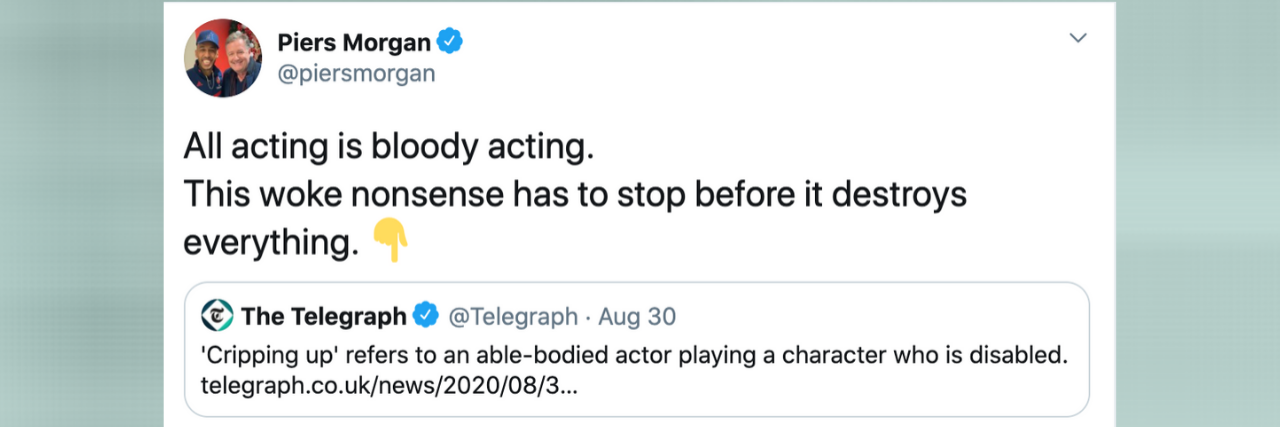Dear Piers Morgan: Insisting Disabled Actors Get Cast in Disabled Roles Isn't 'Woke Nonsense'
Monday morning, British anchor Piers Morgan, who is already known for making controversial statements on Twitter, wrote another problematic tweet. According to Morgan, “The ‘woke nonsense’ is demanding that only disabled actors can play disabled characters. That’s actually the opposite of equal opportunity.” Although his comments came from a spat with another Twitter user, the conversation started when he criticized the term “cripping up” — when an able-bodied actor plays a character who is disabled.
All acting is bloody acting.
This woke nonsense has to stop before it destroys everything. ???? https://t.co/QBxQgE9rmm— Piers Morgan (@piersmorgan) August 31, 2020
I agree with you about the need for equal opportunity. The ‘woke nonsense’ is demanding that only disabled actors can play disabled characters. That’s actually the opposite of equal opportunity. https://t.co/5gM6AMmDdu
— Piers Morgan (@piersmorgan) August 31, 2020
What does being “woke” mean? Generally, wokeness — which comes from the African-American Vernacular English expression “stay woke” — means having social awareness. For example, recognizing that a group has been marginalized for a long while. While there is still so much work to do, it does seem that Hollywood is slowly becoming “woke” with disability culture. Stories about characters with disabilities, starring actors with disabilities, have been rising since last year. Last week, The New York Times published an article about rising actors with disabilities, with two being my real-life friends. Academy-Award winner and legendary actress Octavia Spencer recently made a public statement about creating opportunities for actors with disabilities. This summer, studios such as Disney and Universal teamed up with my past workplace RespectAbility to meet with aspiring filmmakers with disabilities through an inclusive lab, which I was a part of as an aspiring writer (particularly for animation). As you can see, change is coming for us. It’s ableist people like Piers Morgan who are pushing us back to the dark ages.
Mr. Morgan, you are an abled man. You get to see yourself (played by actors who look like you) literally everywhere on screen and stage. I never saw myself on television when I was a child, except on the show “Arthur” with a blind bunny named Marina. Even with her blindness, I could relate with her because she had a disability like me.
Additionally, as a little girl, I only believed I could be a Disney princess because I am a white girl with blonde hair and blue eyes, just like Cinderella and Aurora. I thought of myself to be a blonde Disney princess, but never once thought of myself as a disabled Disney princess with cerebral palsy. And now times are changing, I could be a Disney first.
Tell me: If being considered for a disabled role with abled people is considered “equal,” then why is the latter cast most of the time? Why are disabled people left out of their own stories more often than not? Was the time I lost a TV role of a murderess with cerebral palsy to a perfectly able person considered “equal?” Did the producer who said it would take “too long” to find actually disabled people to star in his disability-centric movie, “Come as You Are,” give disabled actors equal opportunities?
People in the disability community are outspoken about this because these opportunities don’t happen, and unless we’re vocal about it, nothing will change.
People with disabilities also deserve to have our stories told by disabled writers and directors. Maysoon Zayid, a fellow actress and comedian with CP, just now has her big break with the day show General Hospital. No so long ago, she sold a sitcom to ABC and got a talent deal. However, no writers with disabilities were hired or even considered. Thus, the pilot, written by a man like yourself, was “stereotypical, offensive and what the disability community calls ‘inspiration porn.’” Because Zayid wasn’t trusted with her own story, the show never got made.
By “demanding” that disabled characters are played by disabled actors, what we’re really saying is: disability isn’t a “role” that can be played. And because disabled actors don’t need to “act” disabled, they can focus on what being an actor really is: bringing a complex character to life.
Next time you decide to tweet that fighting for disabled actors to play disabled roles apparently “destroys” everything, think about the last time you saw an actor with a disability on TV. Not a character with a disability that’s played by an abled actor. But, an actual disabled character. If you can’t think of the last time, then congratulations! You now know why we, actors with disabilities, need equality.

